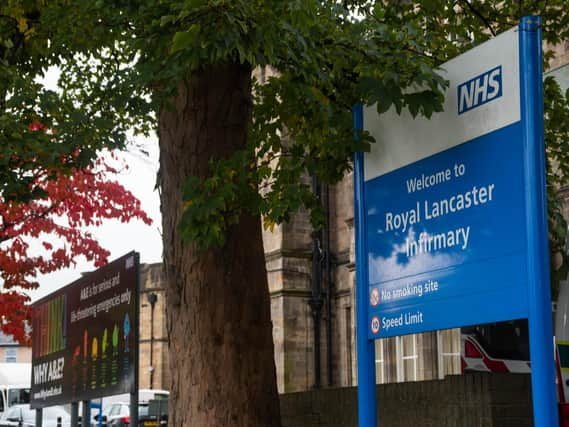First death recorded from coronavirus in last six weeks at Morecambe Bay hospitals trust


The latest death was recorded on Tuesday, and comes after a period dating back to April 12 during which no fatalities as a result of the virus were recorded at hospitals run by University Hospitals of Morecambe Bay NHS Trust (UHMBT), which has now seen a total of 581 deaths from Covid-19 recorded.
The deaths are recorded when someone has died after testing positive for coronavirus within the last 28 days at UHMBT hospitals, with the numbers roughly split between the Royal Lancaster Infirmary and Furness General Hospital in Barrow.
Advertisement
Hide AdAdvertisement
Hide AdAs of Tuesday May 18, there were 11 patients in UHMBT hospitals being treated for Covid-19, one of which was on a ventilator.
Since the start of the pandemic, as of Sunday May 16, UHMBT has treated 2.006 people for the virus.
In the Lancaster City Council region itself, the total number of deaths within 28 days of first positive test result for Covid-19 reported up to Tuesday May 25 is 285.
The total number of deaths where Covid-19 is mentioned as a cause on the death certificate, registered up to Friday May 14, is 329.
Advertisement
Hide AdAdvertisement
Hide AdThe total number of people with a positive Covid-19 virus test (either lab-reported or lateral flow device) reported up to Tuesday May 25 in the Lancaster region is 9,565.
Of those, 32 people in Lancaster reported positive Covid tests in the seven days up to May 25 (an increase of three or 10.3 per cent on the previous week) - and the city currently has an infection rate of 19.9 based on a rolling seven-day period up to May 21.
This is based on the number of coronavirus cases per 100,000 people, and compares with an England average of 23.0.
Meanwhile, new figures suggest the Indian variant of coronavirus has been detected in Lancaster.
Advertisement
Hide AdAdvertisement
Hide AdPublic Health England has been tracking the spread of the B.1.617.2 mutation – which originated in India – by testing positive Covid-19 cases across the country for an "S-gene".
The gene is not present in the dominant Kent variant, which was responsible for a surge in cases over the winter, but is present in other variants of concern, including those from India.
Scientists have determined that the vast majority of the S-gene specimens identified across England in May are the Indian variant.
PHE identified one positive case of the S-gene in Lancaster between May 2 and 14. The majority of areas in England have reported at least one case.
Advertisement
Hide AdAdvertisement
Hide AdThe data shows 6,729 S-gene positive cases were recorded in England between the start of March and May 11 – up from 4,363 by May 5.
Of these, 2,994 (44 per cent) were in the north west – the largest proportion of England's nine regions. PHE analysis suggests that of a national sample of 1,192 positive S-gene specimens, 93 per cent were found to be the B.1.617.2 Indian mutation.
The data comes as a separate PHE study found both the Pfizer and AstraZeneca vaccines were highly effective against the Indian strain after a second dose.
However, the same study found they were only 33 per cent effective three weeks after the first dose.
Advertisement
Hide AdAdvertisement
Hide AdThe efficacy of the vaccines against the new variants is seen as a major obstacle blocking the next stage of the roadmap, but the chief executive of the UK Health Security Agency said the possibility of restrictions being eased on June 21 was “looking good”.
From June 21 at the earliest, nightclubs are due to reopen and restrictions on large events such as festivals are to be lifted, as are restrictions on the number of people at weddings.
However, Professor Adam Finn, a member of the Government’s Joint Committee on Vaccination and Immunisation, believes there may be “adjustment” to the lifting of restrictions.
Asked how likely it is that measures will be lifted on that date, he told Times Radio on Sunday: “We’re effectively in a race with the vaccine programme against the virus. “We know that we’re letting the virus out by spreading it about now, we know that we’re progressing well with the vaccine programme, but I think there’s going to need to be an adjustment of some sort.”